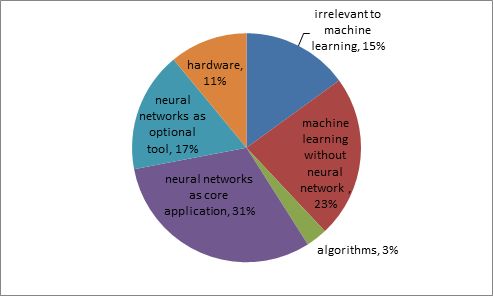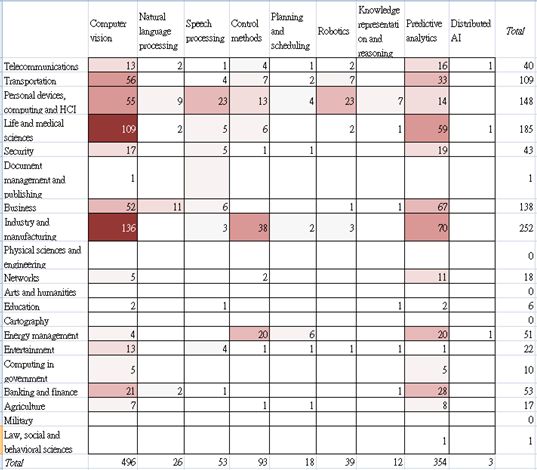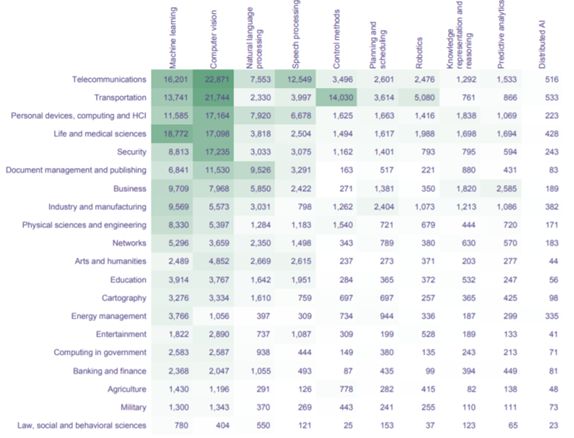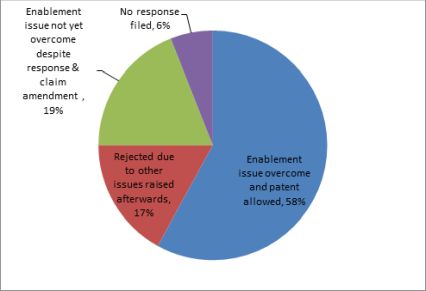- within Intellectual Property topic(s)
In 2018, a total of 1,567 AI-related invention patent applications were filed in Taiwan by 521 applicants, according to a Report released by TIPO on December 3, 2019.
Out of the 521 applicants, only 12 filed more than 20 AI-related invention applications that year, which are Alibaba HK, Beijing Didi Infinity Technology & Development Co., Ltd, Samsung Electronics, KLA-Tencor, ITRI (a Taiwan government sponsored research institute), Google, CHT (a leading telecommunication company in Taiwan), Qualcomm, ASML, Semiconductor Energy Laboratory Co., Ltd., Institute for Information Industry (another Taiwan government sponsored entity), and Acer. As many of the surveyed filings have yet to be laid open, the TIPO's Report does not provide these applicants' respective filing numbers other than a jurisdictional breakdown.

A jurisdictional breakdown of applicants of AI related inventions
filed in Taiwan (2018)
(Translated from the TIPO's Report; same below unless otherwise
noted.)
With a keyword string "artificial intelligence OR machine learning OR neural network OR deep learning OR learning algorithm" to locate the invention filings, a broad definition of AI is adopted in the TIPO's Report to encompass filings even not pertaining to neural networks or deep learning. TIPO's explanation is that their approach is actually modeled after a methodology used in a WIPO report "Technology Trends—2019-Artificial Intelligence" released earlier in the same year (2019) in which a likewise broad definition is adopted to survey the trends in AI technologies, AI functional applications, and AI application fields over the recent decades.
Still, the TIPO's Report looks into whether the inventions disclosed in the 1,567 filings relate to neural networks and how close the links are. The findings show that, only 487 invention applications (or 31%) were filed in 2018 in which neural networks are applied as core technical means, while an addition of 54 inventions (or 3%) dedicate to improvements for algorithms related to neural networks. Apart from that, there were 173 inventions (or 11%) filed for hardware in support of neural networks, making the total number of filings in the above 3 sub-categories (described by the TIPO's Report as what "actually keep abreast with global technological developments") arrive at 714. The significant percentage of said hardware inventions, including inventions in connection with AI chips, AI power supply systems and cooling devices, is quite unique if compared with the global trend in AI development found by WIPO, yet very much reflecting Taiwan's industrial characteristics.

The AI technologies addressed in inventions filed in Taiwan
(2018)
Following the methodology of the WIPO Report again, the TIPO's Report provides a cross-tabulation analysis with "AI functional applications" and "AI application fields" of the located 1,567 inventions, and the findings are as follows.

A cross-analysis of AI-related inventions filed in Taiwan
(2018)
Having the above data compared with the global data revealed in the WIPO Report (see below), the TIPO's Report identifies the following local features (not solely contributed by Taiwanese applicants, of course):
- With respect of the AI application fields, "industry and manufacturing" is ranked as the most densely filed sector, with a percentage well above the global trend. "Energy management" also holds a significant high percentage compared with the global data, while "transportation and telecommunication" is a weaker field in Taiwan than it is in the global context.
- With respect of the the AI functional applications, most of the located inventions go to the "computer vision" box, which is in line with global trend. What is particular about the local data is the strong attraction of "predictive analytics" to applicants, a phenomenon which according to TIPO's observation comes along with the compelling presence of "industry and manufacturing" as an AI application field. In other words, a lot of AI-related invention applications filed in Taiwan within 2018 are dedicated to gathering and analyzing data in manufacturing parameters for machine controlling purposes, the TIPO's Report comments. Similarly, applications falling within the "control methods" box also take a significant percentage.
- There is an inclination to employ "computer vision" related applications in the fields of "life and medical sciences" and "industry and manufacturing."
- With respect of filings within the three major application fields, i.e. "transportation," "personal devices, computing and HCI", and "predictive analysis," only 24%, 30%, and 29% of them, respectively, claim for inventions in which neural networks are used as core technical means. In these three categories, most inventions addressing machine learning still rely upon logic programming.

A cross-analysis provided in the WIPO Report (Figure 3.20)
In the last section of the Report, TIPO analyzes the prosecution status of the located filings. Out of the 1,567 filings, roughly 1,000 have yet to be substantively examined as of August 2019, but out of the remaining roughly 567 filings, 200 have already been allowed for patents within the same timeframe. Another good message for AI-related invention applicants is that their chances in removing examiners' doubts on patentability issues are not low, especially by means of amendment of patent claims. For instance, according to the Report, out of 36 filings in which an enablement issue was raised and the TIPO has issued final Office Actions, 21 filings (or 58%) have been allowed for patents (but the Report does not reveal how many of these granted patents address technologies related to neural networks.)

How enablement issues have been prosecuted in AI-related inventions
filed in Taiwan (2018)
As experience tells us that filings in Taiwan would encounter less and weaker patentability obstacles if substantive examination is deferred until an outcome of a counterpart foreign filing in a leading jurisdiction, we predict that when those roughly 1,000 cases cease their current dormant status and start entering the examination stage, the figure will turn out to be more pleasing to applicants and agree with our understanding that Taiwan's examiners generally take a friendly attitude towards AI-related invention filings. For a brief introduction of the examiners' examination practices in this regard, please refer to another article "Is "Business Method" Patentable?"
The content of this article is intended to provide a general guide to the subject matter. Specialist advice should be sought about your specific circumstances.

